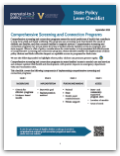Group prenatal care is an effective model of care for pregnant people, facilitated by a trained healthcare provider, and delivered in a group setting, which integrates health assessments, education and skills building, and peer social support.
Rigorous evidence suggests that group prenatal care benefits families’ access to needed care and services and increases the likelihood that pregnant people receive adequate prenatal care. Participation has also been shown to boost parental health and emotional wellbeing, is proven to improve mothers’ physical and mental health, and increases optimal child health and development by increasing breastfeeding initiation rates.
This checklist covers the following policy levers states may consider to help maximize the reach and effectiveness of group prenatal care:
- Implementation and access
- Legislative and financial support
- Non-financial state support




